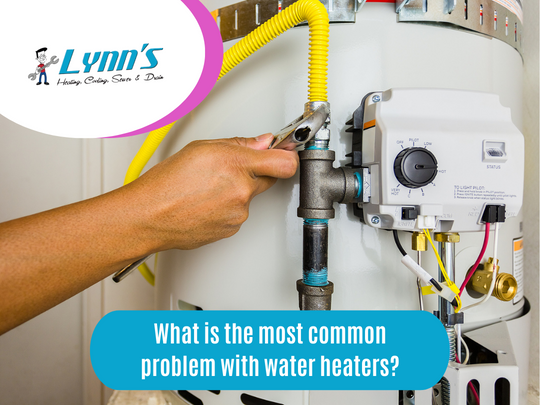What is the most common problem with water heaters?
Don’t let a malfunctioning water heater bring you down - with the right maintenance; it can be as good as new! Invest in proper upkeep today and enjoy an uninterrupted stream of hot water.
Both electric and gas water heaters have drawbacks, so to avoid problems, it's crucial to be aware of the most common problems with water heaters and how to deal with them. The most frequent issue with water heaters is temperature control."
Start your day with a refreshingly hot bath — unless you turn on the faucet and feel like you're dipping into an icy river! Don't let this be another sign of wear and tear. Learn about what causes damage to water heaters, how to maintain them for long-term use, and make sure that warm morning pick-me-up is here to stay.
What signs to look for
Unstable water temperatures could be indicative of underlying issues with your hot water tank. Be vigilant for these fluctuations and address the problem before it becomes more severe.
Here are a few things that show your water heater may be damaged.
Hot water shortage
If you're suddenly taken aback by ice-cold water while washing your hands or stepping in the shower, it could be an indication of a malfunctioning water heater. While hot and cold should ideally alternate during baths, this is not ideal when both temperatures are extreme - suggesting that something may need to be checked out!
Varying temperatures
Unexpected changes in water temperature are usually a sign of deeper issues. Be sure to investigate if these troubling fluctuations occur! If you're finding yourself having to constantly adjust your shower dial, it could be due to an electrical issue or insidious buildup inside the heater unit itself.
Change in appearance
If your water has become cloudy, or you can see rust bubbling through the tap – it's time to take notice! The likely cause is decaying pipes and inner walls in your heater. If left unchecked, these leaks could have substantial consequences - so don't wait any longer to inspect them.
Odd sounds
Unusual noises coming from your water heater are never a good sign. They indicate potentially dangerous buildup inside the tank, so it's best to take action quickly if you hear anything out of the ordinary. These minor issues can lead to major problems down the road - don’t ignore them!
Constant repairs
Evaluating the costs of consistent and expensive water heater repairs? Think twice before embarking on frequent trips to your local home store – when issues occur regularly, replacing it may be more cost-efficient in the long run. Keep track of repair expenses instead; a new water heater might just save you money!
Causes
Is your water feeling a little off? It could be due to one of the many issues with your water heater. Don't worry - we can help you find out why and get it on its way back to perfection!
It's essential to recognize any issues your water heater may be facing in order to get it running smoothly again. To save you time, we've compiled a list of potential causes for malfunctions - let's take a look and find the root problem!
Defective thermostat
Your water heater is designed with two thermostats: one at the top and another at the bottom. These regulating components control hot water output, often experiencing malfunction when either ceases to function correctly. This can lead to reduced levels of hot water unless remedied quickly - ensure that you are aware of these potential issues for optimal performance!
Leaking tank
Homeowners may be unaware that a leaky hot water tank can cause much more than just an unexpected cold shower. If not replaced in time, you could face costly structural damage resulting from mold and mildew formation. Avoid this unpleasant surprise by having a professional replace any suspect valves now!
Broken gas valve
Keeping up a regular maintenance schedule for your water heater is critical to preventing gas leaks, which can prove disastrous. If you experience an unpleasant odor of rotten eggs or garbage in the vicinity of your unit, it could be a sign that toxic fumes are leaking into your home and causing danger for all its inhabitants—not to mention cooling down the warm water supply too quickly!
Using an electric water heater, you can confidently rest assured that the worry of running out of hot water will no longer be a concern.
Mineral buildup
When city-supplied water contains a high amount of calcium and magnesium from limestone, chalk, or gypsum buildup, it becomes "hard" - leading to overheating issues with water heaters. This mineral attachment interferes with the heating element's performance and causes temperatures higher than necessary for comfortable use.
Cracked or broken dip tube
A fractured dip tube can create a startling surprise for any home. Instead of cold water flowing to the bottom, where it should remain in order to be heated up inside the tank, faulty tubing causes an unwelcome trickle into warm waters and eventually leads to unexpected blasts of frigid liquid throughout your entire house!
Damaged heating element
Your water heater is powered by two essential heating elements. If one of them gets damaged, your hot showers will become a thing of the past! The top and bottom components work together to keep temperatures consistent - twice as much effort from one could spell disaster for you if things go wrong.
Moisture
Water heaters are usually located in basements, which can get damp due to several factors, such as flooding. After heavy rain, inspect your water heater for a possible pilot light outage. If you have an electric one, check the circuit breakers, and if there's visible damage, seek professional help.
The water heater is too small
An undersized water heater can hinder proper function. Properties with greater hot water demand require more powerful heaters. Life changes such as a new baby or additional bathroom may affect hot water temperature. Consider your water heater's capacity when planning renovations or growing your family.
Too much demand
Your water heater can be overburdened if it's supplying hot water to multiple points in your home simultaneously. To reduce stress on your water heater, consider spacing out your hot water usage. For example, delay taking a shower when using the dishwasher and washing machine at the same time.
Having a tankless water heater
Tankless water heaters are a popular choice for their instant hot water convenience, but it comes at a cost. Though you may enjoy a wait-free shower, this isn't always the case. The burners that heat the water can turn off, allowing cold water to pass through and lower the temperature.
Aging
Typically, water heaters have a lifespan of 12-15 years. Accumulated issues can lead to malfunction. After seeking a professional diagnosis of potential causes, consider replacing the unit. Repair costs can quickly add up and become more expensive than replacement. As a water heater ages, it becomes harder for it to keep up with demand.
Making your water heater last longer
We never recommend fixing your water heater on your own — always call a professional when you experience temperature problems!
Educating yourself is the first step in preventing future issues. By following our tips, you can extend your water heater’s life span!
Flush your water heater’s tank once per year
Annual flushing of your water heater's tank is recommended by manufacturers to prevent the build-up of sulfur, iron, scale, and other chemicals on its inner walls and pipes.
Flushing your water heater helps preserve it from harm and ensures you receive high-quality water for long-term use. Neglecting to flush can result in rusting or leaks from accumulated residue.
Luckily, most water heaters come with instructions to help you do so safely and efficiently!
Adjust the temperature
You can regulate the warmth of your hot water by adjusting the water heater temperature. Set it to 120℉, but reducing it by 10 degrees can lower energy expenses. Avoid setting the temperature above 140℉ to prevent the risk of burns.
Turn the water heater off and adjust the thermostat to its lowest temperature when taking long trips away from home.
Insulate the heater and pipes
To prolong the lifespan of your water heater, an insulating blanket can be highly effective. Covering the tank prevents heat loss and maintains a consistent hot water supply.
Insulate both hot and cold water pipes with foam pipe insulation. This will prevent condensation buildup on cold pipes during the summer months.
When insulating your heater and pipes, ensure that controls are not covered.
To learn more about water heaters, follow Lynn's HVAC Winnipeg: Plumbing Heating & Cooling on social media and check out their blog at https://lynnswinnipeg.ca/blog/, where we talk about the most common problem with water heaters.































